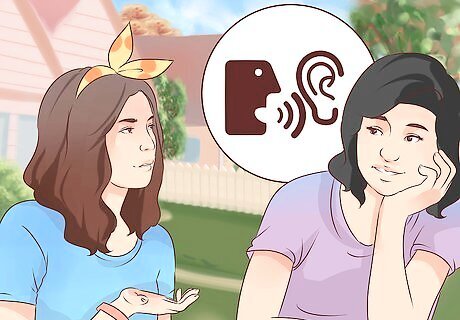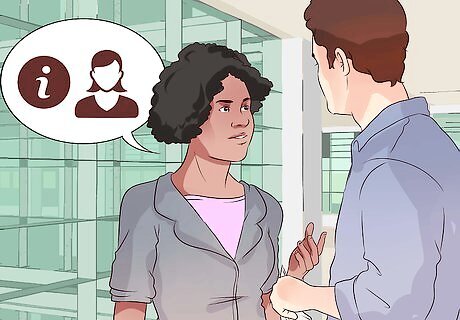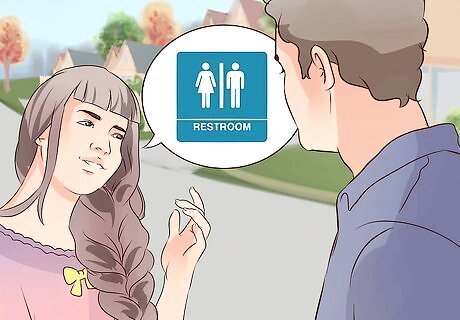
views
Initiating a Conversation

Find a conversation partner. Scan the room and see if there is anyone else who appears approachable and/ or to be hanging out by herself. You can then slowly make your way towards her to start up a conversation. Ask your host beforehand if there is anyone else there who isn’t normally part of the group. You can keep an eye out for this person and mention that your host suggested you talk. Look for cues that the other person doesn’t know anyone, too. This includes scanning the room or standing in the corner away from the crowd. Even if you notice that another person approaches your intended conversation mate, you can also join the two of them and start a conversation. Remember that it’s important to take initiative in situations where you don’t know other people. Not only can it draw people to you, but also make you seem approachable.

Join a group. In some cases, you may be at a large event like a conference or wedding where people tend to congregate in groups. Gradually ease yourself into the crowd of people with whom you’d like to engage and then take the opportunity to make a statement and introduce yourself. Stand by a member of the group until you make eye contact and can introduce yourself. Listen to the conversation for a few minutes as you try and join the group. You can start by standing a bit to the outside of the group and move in slowly by saying, “May I move in a bit? I’m really interested in what’s being said.”

Break the ice. Once you’ve found a person or group with whom you want to socialize, you’ll need to relieve the tension of approaching someone you don’t know. Find a general or clever statement that can kick off a conversation. Figure out things to say before you actually get to the person. For example, if you see an individual you’d like to talk to, notice something that the person is wearing or doing as a way to break the ice. For example, you could say “There are so many accountants in one space- this lawyer feels like a fish out of water.” Turn to the person standing next to you and make a funny comment or compliment. For example, if someone makes a controversial statement you could say “Did I just hear him correctly?” or “I couldn’t keep my eyes off of your beautiful bag.”

Introduce yourself. After you’ve broken the ice, introduce yourself to your conversation mate or mates. Make sure to ask for the other person’s name and repeat it. Not only does this show your interest in the person, but it can also help you remember the person’s name. Say something brief about yourself. For example, try "Hi, my name is Catherine and I’m new to the office. I work in the public relations division. What’s your name and where do you work?" Try commenting on the person’s name to help you remember it and further break the ice. For example, you could say "Krishna is such a beautiful and unusual name. What is its origin?” or "Alex, you and my dearest cousin share a name!" Consider introducing yourself to one person in a group and asking for an introduction to the rest of the participants.
Keeping the Conversation Going

Find a common interest. It can be relatively easy to keep a conversation going once you’ve introduced yourself by finding something that ties you to the other person. Draw on the common situation or something you notice about the person to hold the person’s interest. Your conversation partner may also be able to introduce you to others with similar interests. Notice what the person is wearing or something else about them. For example, you could say “I noticed you have the new iPad Air. My model is four years old and I’m in the market for a new one. How do you like that one?” or “I couldn’t help but notice that you’re reading the same book as me. What do you think of it?” Use the situation to your benefit. For example, if you are at a sporting event say “Are you here participating or watching?” At a work event you could say, “I work in sales and marketing, where do you work?” You can also have a few fun questions in the back of your mind you can ask just to make conversation, like "What were you like in highs school" or "What's something that someone would be really surprised to learn about you?"

Compliment the person. Most people love flattery. Find something nice about the person to say and compliment it. This can help stimulate further conversation and may help you meet other people, too. Make sure your compliment is sincere. Most people can tell when someone is feeding them a line and it may turn the person off of you and the conversation. Focus your compliment on something about their appearance, demeanor, or item they own. For example, you can say “I couldn’t help but staring at that beautiful nail color,” or “That was a beautiful talk! You are so eloquent and engaging,” or “I see you have the latest Android. I’ve been trying to get my hands on it and can’t. I’m totally jealous you have it!” Thank the person if they compliment you back. You can use this as a way to invite them to get to know you better.

Listen intently. Ask questions and repeat key points during the conversation. Not only does this show that you’re listening closely, but also that you are interested in the person or group. Use natural pauses in the conversation to ask questions about something the person has said. You can also repeat an item as a part of your question. For example, you could say “You said that you’re headed to a remote region of Nepal for business. Where are you going? I’ve been to Nepal before and might be able to offer some tips on things to see and do.” Recognize any changes to the overall tone or demeanor, which can signal you to ask a question or offer a statement. For example, if the person appears hesitant to say something you could say “You mentioned that one of your duties is to check up on lab ethics. How do you find balance if you encounter a bad situation?”

Offer information about yourself. A good conversation is all about balance between each conversation partner. Make sure that you have a chance to talk and let the person or group know something about you and your interests. Allow the conversation to flow naturally and offer information at the right moment. For example, if the group is talking about something that you work on or have interest in, you could say “That’s a really interesting point, Sara. I’ve been working on a similar issue and have noticed the same patterns. Has anyone else here seen them?” Give your opinion or make statements without being overbearing or interrupting others. For example, you can say "I see your point, but I don't share it. I believe that it's right for every person to have the same right to work." Make sure the information you offer about yourself is similar to what others tell about themselves. For example, if the conversation is strictly related to work, keep your comments to your professional life and don’t add anything about your personal situation. It helps some people to always have in mind five things about themselves they think are interesting, that they feel comfortable revealing and sharing.

Be sincere. Most people don’t like being around someone who acts fake. One of the best ways to attract people to socialize with you is by keeping your comments and questions sincere. Acknowledge what the other person or members of a group are saying. For example, you could say “I really understand where you are coming from on that point, Edward.” Try and talk about different topics. Since you don’t know the people, consider keeping the conversation light and funny.

Use discretion. Avoid giving away too much information or talking about others when you’re with people you don’t know. Saying too much may make people uncomfortable and want to stay away from you. Keep comments that might be offensive or touch on a sensitive topic to yourself. It’s often a good idea to keep your views on politics or religion to yourself when you’re with a group or person who you don’t know. Ask honest questions if you’re unsure of something. For example, you could say “I thought stem cell research was fairly controversial within the evangelical community. Could you tell me a little bit more about it?” Remember to not say anything negative about others. If you’re among people you don’t know, you unlikely don’t know who is friends with whom. Refrain from making any negative comments or agreeing with something mean someone else says. You can get yourself out of these situations by saying something like “Oh, I don’t know him, so I don’t have anything to add.”
Excusing Yourself Politely

Make a common excuse. Chances are that you’ll want or need to end a conversation with a person or people you don’t know. Make up a common excuse to get you out of the conversation and leave the experience positive. You might tell the others that you are: Going to grab another drink or some more food. Making an important phone call. Heading to the restroom. Getting some fresh air.

Use an interruption to your benefit. If something or someone interrupts your conversation, take it as end your interaction. This can help you find another person or group with whom to socialize or bring into the conversation. Recognize natural pauses in the conversation. If there are a lot of “ums” and “ahs,” this may be your cue to excuse yourself. You could say “oh, I just realized how late it is” after looking at a clock or your watch or “I’ve really enjoyed talking, but I need to excuse myself and go to the restroom.” Look for a common item in the room that jogs your memory. For example, say “wow, I didn’t realize that the buffet is closing down so early. I need to grab something to eat because I haven’t had dinner yet,” after glancing towards the food. See if there is anyone else with whom you’ve chatted at the event and mention the person to your conversation partner. For example, you could say “You know, I was just talking to that gentleman Tom about this same thing. Maybe we could make our way in that direction and get his views. He had a really interesting take on the matter.”

Consider the person’s time. Frame your exit as beneficial to your conversation mate or mates. You can make comments such as “I don’t want to monopolize your time” to signal that you’re ready to finish the conversation. Excuse yourself with phrases such as “I’m sure don’t want me to monopolize your time with all of these interesting people around. I’ll let you go in the hope that we’ll see each other again soon.”

Get contact information. Ask the person or group for a way to stay in contact or follow up on the conversation. This can naturally cue them that you need to excuse yourself and that the chat is over. Ask the person for their email address or phone number because you’d like to continue the conversation. If you’re in a business setting, you can ask if the person has a business card. Let the person know you’ll follow up to figure out a way to meet again. Take a quick glance at the information and confirm it back to the person, which shows that you respect her. Make sure to follow up with the person if you’ve said you will contact her for coffee or another conversation.

Return to the original subject. Bringing the conversation back to what you first discussed can help end the exchange. Repeat the person’s name in your final comment and consider asking a question to end on a positive note. Keep this transition natural by asking a question related to what broke the ice. For example, you could say “Sara, I’m so sorry but I have a terrible memory and can’t remember the name of that nail polish. Could you please tell me again?” After she mentions it, tell her “I need to find my phone and put the name in before I forget it again.”




















Comments
0 comment